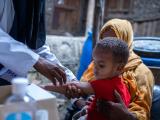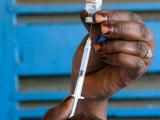Aug 29, 2002 (CIDRAP News) Ð The Centers for DiseaseControl and Prevention (CDC) is much better prepared to deal with a terroristattack now than it was a year ago, before Sep 11 and the subsequent anthraxattacks, CDC officials said this week.
At an Aug 27 press conference at CDC headquarters inAtlanta, officials reported improvements in disease surveillance, laboratorycapacity, emergency response staffing, personnel training, and cooperation withstate and local public health agencies.
"We are scaling up, speeding up, and streamlining ouroperations," said CDC Director Julie Gerberding, MD, as quoted in theconference transcript. "Our preparedness is very high, but we're not satisfied,and we have more work to do, and we intend to get the job done right."
When officials were asked if they personally feel moresecure against the threat of bioterrorism than they did a year ago, Dr JamesHughes, director of the National Center for Infectious Diseases, said, "Iwould say that we're substantially better off today in responding to thisyear's West Nile national extension in a much more effective way now than wewould have been absent the experience in responding to the [anthrax] attacks."
Gerberding said state and local public health agencies haveprogressed rapidly in their bioterrorism preparedness as a result of the $918million allocated this year for the CDC's state grant program. "Alreadymany states have achieved the benchmark capacities or are well on their way toachieving benchmark capacities in this regard," she said. She stated sheis "very optimistic" that the same amount or more will be allocatedin fiscal year 2003.
The National Pharmaceutical Stockpile has been augmented withmany additional antibiotics and vaccines in the past year, and the number ofemergency "push packs"Ñlarge containers of medical suppliesstored at secret sites nationwideÑhas been increased as well, Gerberdingsaid.
Joseph Henderson, the CDC's associate director forbioterrorism preparedness, said Florida and some other states have madeprogress in planning how to receive and handle the push packs, but "a lotof states obviously need to do more" in that area.
Gerberding and Hughes said the CDC has improved its ownlaboratory capacity and supported an increase in the Laboratory ResponseNetwork (LRN). The LRN now includes 200 public health laboratories, with atleast one in every state, said Hughes.
The CDC remains on "extremely high alert" forbioterrorism, said Hughes. To strengthen disease surveillance, the agency ismonitoring emergency room visits, pharmacy records, 911 calls, and calls topoison-control centers and is communicating with veterinarians, he reported.
Hughes also said the CDC has a new Emergency OperationsCenter, which is helping to manage the response to the West Nile virus and"has greatly increased our ability to work in a timely manner with ourpartners around the country."
Dr. Richard Jackson, director of the CDC's National Centerfor Environmental Health, said that before Sep 11, the Emergency OperationsCenter was a "small ad hoc activity." To deal with major emergenciesinvolving hundreds of field personnel, the agency needs a well-equippedfacility with secure communications, he said. "That is in placetemporarily," he added, "but by the end of the year, we willphysically have an operations center that is the quality of anything in theworld."
When Gerberding was asked if the CDC's emphasis onbioterrorism preparedness is causing other CDC programs to suffer, she said shecouldn't really answer the question because programs such as surveillance foremerging infectious diseases serve both bioterrorism and general public healthpreparedness. "We are not taking away from other programs to enhanceterrorism [preparedness], but we are trying to make these investments have asmuch impact overall as we can," she said.
She also said the CDC has increased its staff since a yearago by hiring people to administer the state grants and increase othercapabilities. But the preexisting staff also contributes to terrorism responseefforts, she added.
CDC officials were also asked how their response woulddiffer from what they did last fall if they were confronted with anothersituation like the anthrax attacks. Gerberding responded, "One of the mostimportant things that would be different this time around is that we wouldprepare people for the fact that we learn as we go, and what's going on todayis not likely to be the same as what's going on tomorrow because we will havenew information and we will be learning something. . . . I think that will be avery major difference."
In addition, the CDC learned last fall that it is hard tomaintain one's "scientific perspective" in the middle of an intenseinvestigation, she said. "One of the lessons we learned is that we need toset aside some scientists at CDC and outside CDC who aren't involved in theday-today things but are there to second-guess or ask questions or go to thelibrary or get answers to things that come up on a moment's notice." Theagency has such a team working on the West Nile virus situation, she said.
Henderson said another important lesson of the anthraxattacks is that the CDC's epidemiologic investigation needs to be coupled withany criminal investigation by law enforcement authorities. Last fall, that wasdone well in some cases but not so well in others, he said.
Regarding personnel training, the CDC has used a variety ofmethods to educate clinicians and other healthcare personnel aboutbioterrorism-related diseases, said Hughes. Efforts have included satellitevideo conferences, classroom courses, the CDC Web site, print publications, andcooperation with professional societies.
Gerberding said the agency has seen an increase in callsfrom clinicians reporting suspected cases of smallpox and other potentialdiseases of bioterrorsm. This development is "telling us that the messageis hitting home because the clinicians are calling us when they're concerned,"she said.
The first question asked in the briefing was on when federalofficials will announce a decision on smallpox vaccination policy and what itmight be. (In June, the CDC's Advisory Committee on Immunization Policy, aftera series of forums, recommended smallpox vaccination only for certainhealthcare workers and law enforcement people who would have to responddirectly to a smallpox outbreak. An announcement from the Department of Healthand Human Services [HHS] has been awaited since then.)
Gerberding said the CDC is working with HHS "to make afinal determination of the federal policy in the context of homeland securityand national security. . . . We don't have a final plan yet, but I can assureyou that we are working almost around the clock to get the plans finalized andto make sure that we understand the logistical implications and the resourceimplications as well as the human implications of any decision."
When she was asked why members of the public can't get thevaccine if they want it, Gerberding said the available vaccine is classified asan investigational new drug that requires informed consent. "It's best tothink of it more or less as a research protocol, and so we don't generally makethings available to people on a research protocol unless there's a strongreason for it." After the vaccine is licensed, the question of voluntaryvaccination for the public can be revisited, she said.
See also:
CDC transcript of the telebriefing
http://www.cdc.gov/media/transcripts/t020827.htm



















